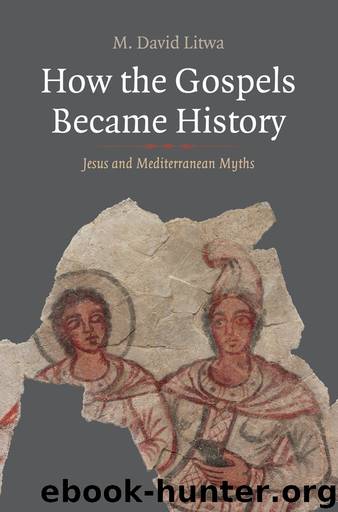How the Gospels Became History by M. David Litwa;

Author:M. David Litwa; [Litwa, M. David]
Language: eng
Format: epub
ISBN: 9780300242638
Publisher: Yale University Press
Published: 2019-01-15T07:00:00+00:00
CHAPTER ELEVEN
THE PHARMAKOS
A mythos that is made up, if it carries conviction, always enthralls its audience.
—Alexander Romance 2.15.51
There appears in ancient Mediterranean mythography a sacred figure named the pharmakos. Pharmakos is a Greek word often translated as “scapegoat.” It designates a human being expelled or killed in order to heal the community. The human being is often the most virtuous and noble person, but he or she is treated like scum and the worst criminal.
In Greek antiquity, there were rituals in which pharmakoi (the plural of pharmakos) were mistreated and expelled by their respective cities. These pharmakoi tended to be marginal persons—slaves, beggars, the deformed, and so on. In mythography, by contrast, pharmakoi were often portrayed as royal or of noble blood. Despite their pedigree, however, pharmakoi sometimes appeared in the guise of beggars or slaves.
We see the template play out in the account of Codrus, king of Athens. His story was already popular in the fourth century BCE and can be summarized as follows. When enemy troops invade the lands surrounding Athens, the people of the city ask Apollo of Delphi whether the invaders will capture their city. The god responds that they will do so unless the Athenian king is killed. Knowing this, Codrus secretly decides to sacrifice himself. To do so, he must change his form; he must go from the one highest in honor to the lowest. So the king dresses himself in the rags of slaves. He heaves on his shoulders a load of wood and walks outside the city. When enemy troops accost him, he pulls a weapon and is slaughtered in the ensuing brawl. When the invaders recognize the king’s corpse, they immediately break camp and march off.
Ambiguity plays a key part in this tale: the pharmakos is both the best and the worst member of society. Only the best ought to be sacrificed; only the worst is fit for slaughter. To modern readers, Codrus’s story is a myth; but ancient Athenians understood it as part of their history. To prove it, they could point to a local sanctuary of Codrus erected in honor.2
The Theban prince Menoeceus was another widely known example of a pharmakos. When his city (Thebes in central Greece) is about to fall in battle, the aged priest Tiresias makes a prophecy. He prophesies that if a person of royal blood is offered as an atoning sacrifice, the city will be saved. Menoeceus was part of the royal family and son of the future king. In his own mind, he readily recognizes the will of Apollo: he must die on behalf of his people.
Twice the poet Statius (a contemporary of the evangelists) called Menoeceus a “sacrificial animal,” led “like a silent sheep from the flock.” Yet the hero’s heart is possessed by heavenly power. Before he sacrifices himself, he prays, “O gods above . . . and you who grant me to die by so great a death, Apollo, give constant joy to Thebes. This joy I have covenanted to give and lavishly bought with the price of all my blood.
Download
This site does not store any files on its server. We only index and link to content provided by other sites. Please contact the content providers to delete copyright contents if any and email us, we'll remove relevant links or contents immediately.
Cecilia; Or, Memoirs of an Heiress — Volume 1 by Fanny Burney(32558)
The Great Music City by Andrea Baker(32020)
Cecilia; Or, Memoirs of an Heiress — Volume 2 by Fanny Burney(31956)
Cecilia; Or, Memoirs of an Heiress — Volume 3 by Fanny Burney(31942)
We're Going to Need More Wine by Gabrielle Union(19046)
All the Missing Girls by Megan Miranda(16031)
Pimp by Iceberg Slim(14508)
For the Love of Europe by Rick Steves(14123)
Bombshells: Glamour Girls of a Lifetime by Sullivan Steve(14077)
Talking to Strangers by Malcolm Gladwell(13371)
Norse Mythology by Gaiman Neil(13370)
Fifty Shades Freed by E L James(13243)
Mindhunter: Inside the FBI's Elite Serial Crime Unit by John E. Douglas & Mark Olshaker(9344)
Crazy Rich Asians by Kevin Kwan(9293)
The Lost Art of Listening by Michael P. Nichols(7506)
Enlightenment Now: The Case for Reason, Science, Humanism, and Progress by Steven Pinker(7314)
The Four Agreements by Don Miguel Ruiz(6765)
Bad Blood by John Carreyrou(6622)
Weapons of Math Destruction by Cathy O'Neil(6281)
